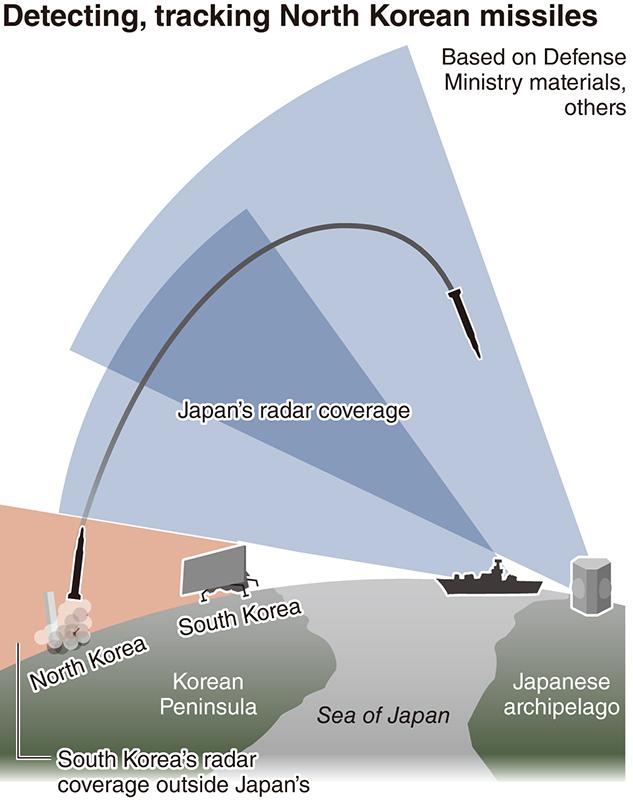15:02 JST, January 2, 2023
Tokyo and Seoul have begun mulling the possibility of instantly sharing radar information that detects and tracks North Korean missiles, several officials of both governments said.
An idea to partially have the two countries’ systems linked via the United States has been floated. If realized, this would enable Japan and South Korea to grasp missile flight data quicker, helping both countries improve the capabilities of their missile defense systems and the dissemination of relevant information to the public.

According to senior officials of the two governments, discussions on technical matters have begun between Japan, the United States, and South Korea, including the U.S. Indo-Pacific Command. They intend to accelerate the discussions, aiming for the realization of the envisaged idea as early as this year.
A drawback of missile defense systems is that radar radio waves to detect and track an enemy’s missiles cannot reach below the horizon because the Earth is round.
As such, Japan’s radar cannot detect a missile until it reaches a certain altitude. The South Korean radar may become unable to track the missile in some cases should it fall into the waters near Japan or the Pacific Ocean. Because of these drawbacks, the two countries announcements in the past on the missiles flown differed in information such as the number of missiles launched and their flight distances.
To resolve these issues, Japan and South Korea intend to mutually provide radar-gathered information through the U.S. Indo-Pacific Command.
Japan’s Self-Defense Forces and U.S. forces in Japan, and the South Korean military and U.S. forces in South Korea have between each other already connected their systems and shared instant missile information.
South Korea is geographically closer to North Korea than Japan and can detect North Korea’s missiles by radar earlier than Japan. A missile launched by North Korea is said to generally reach Japan within about 10 minutes, so there is not a moment to be lost in responding.
Based on information obtained by the U.S. military via early warning satellites on the launch point, flight direction, and speed of the missiles, Japan’s Aegis-equipped vessels will look for missiles by pointing their radars to certain parts of the airspace.
“In some cases, we cannot find them promptly,” a Defense Ministry official said.
If Japan can receive information gathered via South Korea’s radars without delay, the radars of Japanese Aegis vessels will be able to quickly grasp the flight data of missiles and detect them rapidly and with certainty, thus increasing the reliability of interceptions. This may also lead to an early transmission of missile flight information via Japan’s nationwide, instantaneous warning system J-Alert, through which the government will call on residents to evacuate if a missile is feared to fall in Japan.
Japan and South Korea currently exchange missile-related information on an after-the-event basis based on the General Security of Military Information Agreement (GSOMIA).
Japan, the United States, and South Korea decided at a summit last November that the three countries have the intention to share in real-time North Korea’s missile-related information. As a framework, they are considering the use of the trilateral information-sharing arrangement among their defense authorities that was concluded in 2014.
Top Articles in Politics
-

Japan PM Takaichi’s Cabinet Resigns en Masse
-

Sanae Takaichi Elected Prime Minister of Japan; Keeps All Cabinet Appointees from Previous Term
-

Japan’s Govt to Submit Road Map for Growth Strategy in March, PM Takaichi to Announce in Upcoming Policy Speech
-

LDP Wins Historic Landslide Victory
-

LDP Wins Landslide Victory, Secures Single-party Majority; Ruling Coalition with JIP Poised to Secure Over 300 seats (UPDATE 1)
JN ACCESS RANKING
-

Japan PM Takaichi’s Cabinet Resigns en Masse
-

Japan Institute to Use Domestic Commercial Optical Lattice Clock to Set Japan Standard Time
-

Israeli Ambassador to Japan Speaks about Japan’s Role in the Reconstruction of Gaza
-

Man Infected with Measles Reportedly Dined at Restaurant in Tokyo Station
-

Videos Plagiarized, Reposted with False Subtitles Claiming ‘Ryukyu Belongs to China’; Anti-China False Information Also Posted in Japan






















